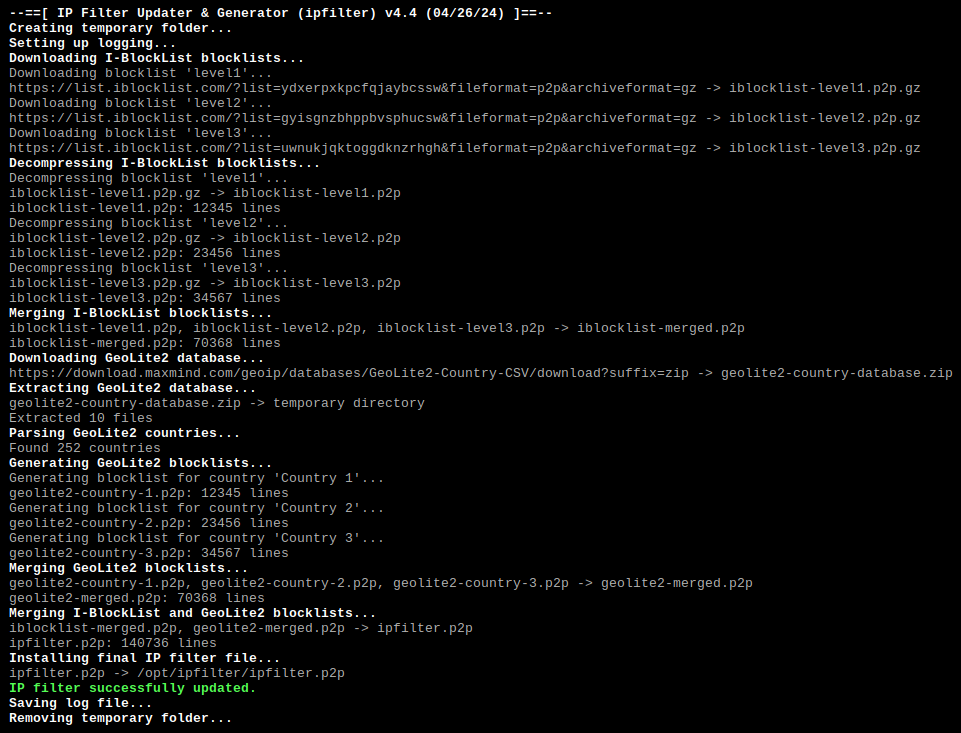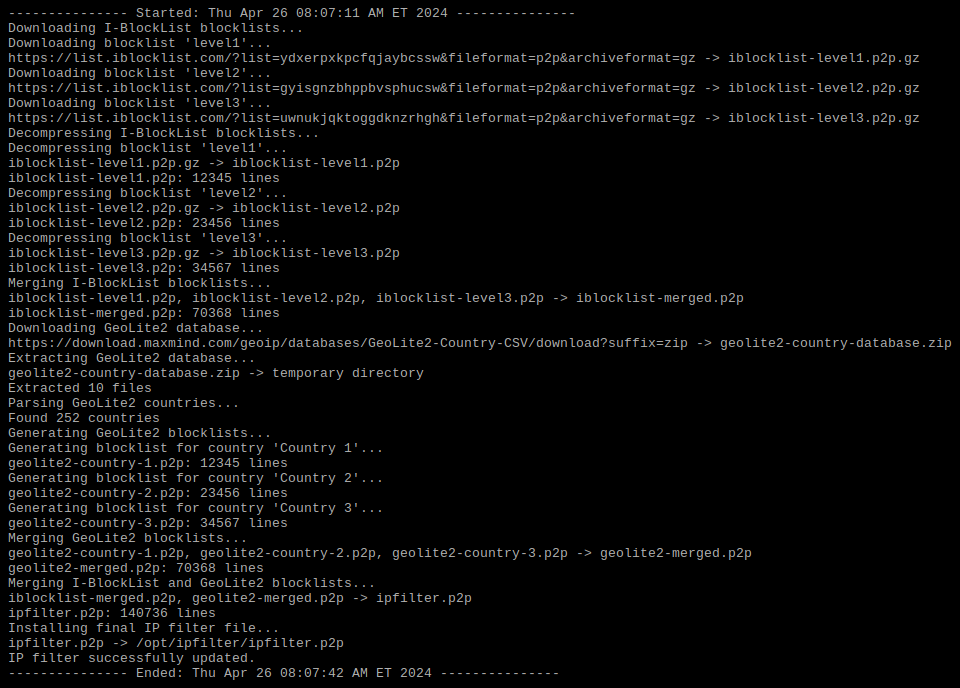Generates PeerGuardian (.p2p) blocklist from I-BlockList blocklists and GeoLite2 country blocks. Suitable to run as a system service on always-on devices (e.g. NAS, Raspberry Pi).
I'm striving to become a full-time developer of Free and open-source software (FOSS). Donations help me achieve that goal and are highly appreciated.
Operating System:
Linux, FreeBSD, macOS or Windows.
Tools & Utilities:
Bash (>=4.0), awk, grep, gunzip, sed, unzip, curl -or- wget, gzip/bzip2/xz/zip(1), notify-send/osascript/powershell(2).
(1) optional, required for gzip/bzip2/xz/zip compression of output file
(2) optional, required for desktop notifications on Linux+FreeBSD/macOS/Windows
macOS users might want to use Homebrew to install missing dependencies.
Windows users need to setup a suitable runtime environment. Cygwin, MSYS2, Git for Windows and Windows Subsystem for Linux should all work fine. Git for Windows might be the best choice to get started - it is reasonably lightweight, easy to set up, meets all requirements out of the box and is also available as a portable version. Refer to Windows Runtime Environments for additional information.
Refer to the releases section for downloads links. There is no installation required. Simply extract the downloaded archive to a folder of your choice. Optionally, ipfilter may be set up as a system service (Linux with systemd only).
Open ipfilter.conf in your favorite text editor and adjust the settings to your liking. Refer to embedded comments for details. Note that before changing any settings, it is recommended to run ipfilter with default settings first to make sure it works as expected. Refer to this section for a listing of all configuration options and current defaults.
Using the I-BlockList feature requires a username and a PIN which can be obtained free of charge after signing up. Note that while most lists are free to download, there are also a few lists that are only available to subscribers. Those subscription-only lists are currently unsupported - please open an Issue if you have a subscription and want to help with adding support.
Using the GeoLite2 feature requires an account ID and a license key which can be obtained free of charge after signing up (refer to this blog post for details).
As settings are configured via ipfilter.conf, ipfilter intentionally features only few command line options:
--==[ IP Filter Updater & Generator ]==--
Usage: ipfilter.sh [OPTIONS]
Options:
-n, --notify Send desktop notification to inform user
about success/failure (useful for cron)
-k, --keep-temp Do not remove temporary folder on exit
(useful for debugging)
-h, --help Display this help message
In most cases, it should be sufficient to run ipfilter without supplying any options:
$ cd ipfilter-vX.Y
$ ./ipfilter.sh
Alternatively, set up ipfilter to run as a system service (Linux with systemd only) or use a scheduler like cron (recommended for long-term use).
When running non-interactively (e.g. as a system service or via cron), you might want to supply option -n/--notify to send desktop notifications informing you about success/failure (recommended on desktop systems).
Note that root privileges are generally not required to run ipfilter. Just make sure the configured INSTALL_DST points to a location writeable by the user running ipfilter. The same applies to LOG_FILE if logging is enabled.
To set up ipfilter as an isolated system service, run the following commands in a console (Linux with systemd only):
$ sudo bash
# useradd -d /var/lib/ipfilter -s /sbin/nologin -c "User for IP Filter Updater & Generator" ipfilter
# mkdir /var/lib/ipfilter
# chown ipfilter:ipfilter /var/lib/ipfilter
# chmod 700 /var/lib/ipfilter
# cd ipfilter-vX.Y
# cp ipfilter.sh ipfilter.conf CHANGELOG.md README.md /var/lib/ipfilter
# touch /var/lib/ipfilter/ipfilter.log /var/lib/ipfilter/ipfilter.stdout.log /var/lib/ipfilter/ipfilter.stderr.log
# chown ipfilter:ipfilter /var/lib/ipfilter/*
# cp ipfilter.service ipfilter.timer /etc/systemd/system
# sed -i -e 's|%{USER}|ipfilter|g' -e 's|%{GROUP}|ipfilter|g' -e 's|%{HOME}|/var/lib/ipfilter|g' /etc/systemd/system/ipfilter.service
# systemctl daemon-reload
# systemctl enable ipfilter.timer
# systemctl start ipfilter.timer
# exit
NOTE:
This creates user/group ipfilter with home directory /var/lib/ipfilter and installs ipfilter there. Make sure to point INSTALL_DST in ipfilter.conf to a location that is writeable by user ipfilter and readable by whatever application wants to access the generated .p2p file. See comments within /etc/systemd/system/ipfilter.service and /etc/systemd/system/ipfilter.timer for customization options.
To fully clean up an existing system service setup, run the following commands:
$ sudo bash
# systemctl stop ipfilter.timer
# systemctl disable ipfilter.timer
# systemctl stop ipfilter.service
# rm /etc/systemd/system/ipfilter.service /etc/systemd/system/ipfilter.timer
# systemctl daemon-reload
# userdel -r ipfilter
# exit
Console output (verbose):
Log file output (verbose):
Configuration options and current defaults:
# ipfilter.conf
# ------------------------------------------------------------------------------
# -
# IP Filter Updater & Generator (ipfilter) -
# -
# Created by Fonic (https://github.com/fonic) -
# Date: 04/15/19 - 08/18/24 -
# -
# ------------------------------------------------------------------------------
# Switch to toggle verbose output (for both console + log file)
# Format: String
# Example: VERBOSE_OUTPUT="true" | VERBOSE_OUTPUT="false"
# Default: VERBOSE_OUTPUT="false"
VERBOSE_OUTPUT="false"
# Path of file to log output to (folder + filename)
# NOTE: ${SCRIPT_DIR}: directory where 'ipfilter.sh' is stored, ${SCRIPT_NAME}: name of file 'ipfilter.sh' without extension
# Format: String
# Example: LOG_FILE="/var/log/ipfilter.log"
# Default: LOG_FILE="${SCRIPT_DIR}/${SCRIPT_NAME}.log"
LOG_FILE="${SCRIPT_DIR}/${SCRIPT_NAME}.log"
# Mode to use for logging and log file handling
# NOTE: Set to 'disabled' to disable logging entirely
# Format: String
# Example: LOG_MODE="disabled" | LOG_MODE="overwrite" | LOG_MODE="append"
# Default: LOG_MODE="append"
LOG_MODE="append"
# Switch to toggle colored output for log file
# Format: String
# Example: LOG_COLORS="true" | LOG_COLORS="false"
# Default: LOG_COLORS="false"
LOG_COLORS="false"
# Options to pass to curl when downloading files
# NOTE: To debug download issues, temporarily remove option '--fail' and check contents of downloaded files for server messages
# Format: Array of strings
# Example: CURL_OPTS=("--fail" "--location" "--silent" "--show-error" "--retry" "8" "--connect-timeout" "120" "--proxy" "<protocol>://<host>:<port>")
# Default: CURL_OPTS=("--fail" "--location" "--silent" "--show-error" "--retry" "2" "--connect-timeout" "60")
CURL_OPTS=("--fail" "--location" "--silent" "--show-error" "--retry" "2" "--connect-timeout" "60")
# Options to pass to wget when downloading files
# NOTE: wget is used only if curl is not available; do not add option '--quiet' here as this will also suppress error messages
# Format: Array of strings
# Example: WGET_OPTS=("--no-verbose" "--tries=9" "--timeout=120" "--execute" "use_proxy=yes" "--execute" "http_proxy=<host>:<port>")
# Default: WGET_OPTS=("--no-verbose" "--tries=3" "--timeout=60")
WGET_OPTS=("--no-verbose" "--tries=3" "--timeout=60")
# Username to use to download blocklists from I-BlockList (https://www.iblocklist.com)
# NOTE: A valid username is required to use the I-BlockList feature; this is the same username
# that you use to sign in to your I-BlockList account (https://www.iblocklist.com/login)
# Format: String
# Example: IBL_USER="user"
# Default: IBL_USER=""
IBL_USER=""
# PIN to use to download blocklists from I-BlockList (https://www.iblocklist.com)
# NOTE: A valid PIN is required to use the I-BlockList feature; to obtain your PIN, sign in to
# your I-BlockList account and click on the 'Member' button (or navigate manually to URL
# https://www.iblocklist.com/member)
# Format: String
# Example: IBL_PIN="123456"
# Default: IBL_PIN=""
IBL_PIN=""
# List of blocklists to download from I-BlockList (https://www.iblocklist.com)
# NOTE: To identify valid ids, inspect hyperlink targets or column 'Update URL' on this web page: https://www.iblocklist.com/lists
# e.g. 'level1' -> 'https://www.iblocklist.com/list?list=ydxerpxkpcfqjaybcssw' -> id is 'ydxerpxkpcfqjaybcssw' -> ["level1"]="ydxerpxkpcfqjaybcssw"
# Format: Array of name-id-pairs (i.e. string-string-pairs)
# Example: IBL_LISTS=(["badpeers"]="cwworuawihqvocglcoss" ["adservers"]="zhogegszwduurnvsyhdf")
# Default: IBL_LISTS=(["level1"]="ydxerpxkpcfqjaybcssw" ["level2"]="gyisgnzbhppbvsphucsw" ["level3"]="uwnukjqktoggdknzrhgh")
IBL_LISTS=(["level1"]="ydxerpxkpcfqjaybcssw" ["level2"]="gyisgnzbhppbvsphucsw" ["level3"]="uwnukjqktoggdknzrhgh")
# Account ID to use to download GeoLite2 country blocks database (https://dev.maxmind.com/geoip)
# NOTE: A valid account ID is required to use the GeoLite2 feature; to obtain your account ID, sign
# in to your MaxMind account and navigate to: My Account -> Account -> Account Information
# Format: String
# Example: GL2_ID="123456"
# Default: GL2_ID=""
GL2_ID=""
# License key to use to download GeoLite2 country blocks database (https://dev.maxmind.com/geoip)
# NOTE: A valid license key is required to use the GeoLite2 feature, see URL below for details:
# https://blog.maxmind.com/2019/12/18/significant-changes-to-accessing-and-using-geolite2-databases/
# Format: String
# Example: GL2_LICENSE="1a2b3c4d5e6f7g8h"
# Default: GL2_LICENSE=""
GL2_LICENSE=""
# List of countries to block using GeoLite2 country blocks (https://dev.maxmind.com/geoip)
# NOTE: For a list of valid country names, download ZIP archive from URL below and inspect file 'geolite2-country-locations-en.csv':
# https://download.maxmind.com/app/geoip_download?edition_id=GeoLite2-Country-CSV&license_key=<your-gl2-license-key>&suffix=zip
# Format: Array of strings
# Example: GL2_COUNTRIES=("Tomorrowland" "Soldier Island" "Wonderland")
# Default: GL2_COUNTRIES=()
GL2_COUNTRIES=()
# IP protocol versions to process for GeoLite2 country blocks (https://dev.maxmind.com/geoip)
# NOTE: Only few applications actually support and recognize IPv6 ranges in .p2p files
# Format: Array of strings
# Example: GL2_IPVERS=("IPv4") | GL2_IPVERS=("IPv6") | GL2_IPVERS=("IPv4" "IPv6")
# Default: GL2_IPVERS=("IPv4")
GL2_IPVERS=("IPv4")
# Path to install final output file to (folder + filename)
# NOTE: ${SCRIPT_DIR}: directory where 'ipfilter.sh' is stored, ${SCRIPT_NAME}: name of file 'ipfilter.sh' without extension
# Correct file extension will be determined automatically, there is no need to modify this when changing 'COMP_TYPE'
# Format: String
# Example: INSTALL_DST="/tmp/blocklist.p2p"
# Default: INSTALL_DST="${SCRIPT_DIR}/${SCRIPT_NAME}.p2p"
INSTALL_DST="${SCRIPT_DIR}/${SCRIPT_NAME}.p2p"
# Type of compression to apply to final output file (in-place)
# NOTE: Correct file extension will be determined automatically, there is no need to modify 'INSTALL_DST' when changing this
# Format: String
# Example: COMP_TYPE="none" | COMP_TYPE="gzip" | COMP_TYPE="bzip2" | COMP_TYPE="xz" | COMP_TYPE="zip"
# Default: COMP_TYPE="none"
COMP_TYPE="none"Last updated: 08/18/24

